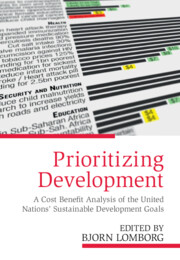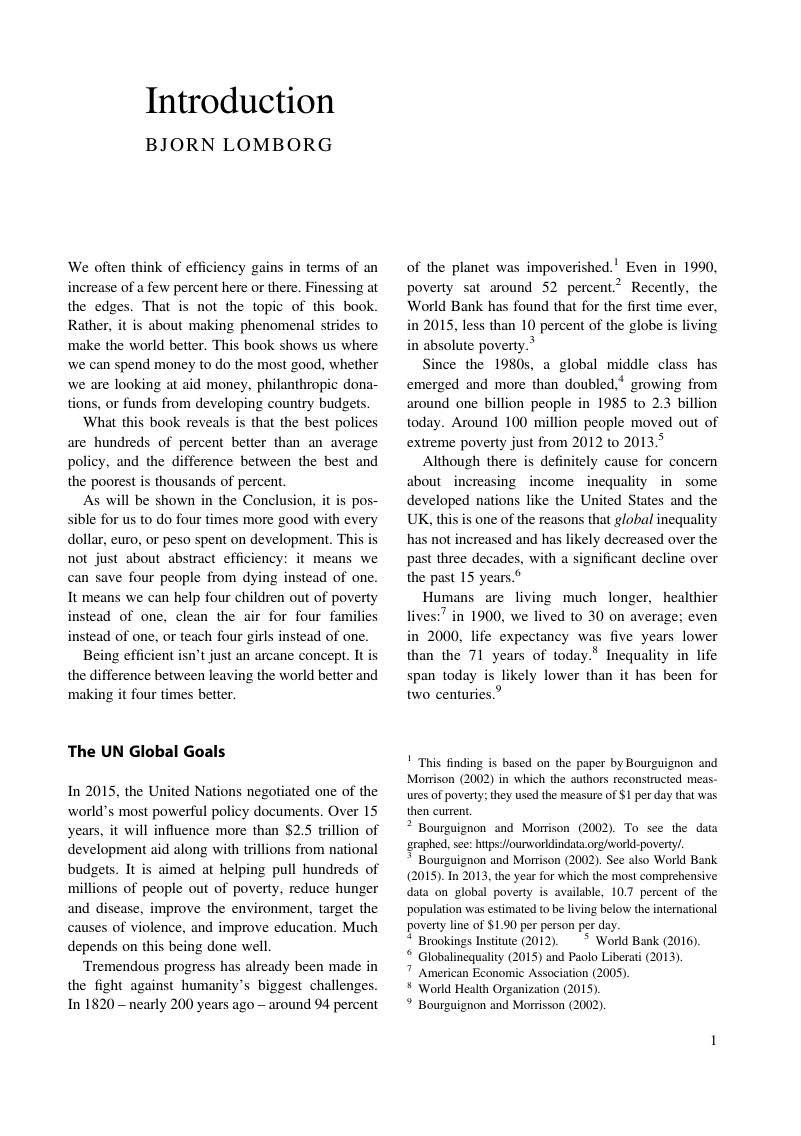 Prioritizing Development
Prioritizing Development Book contents
- Prioritizing Development
- Prioritizing Development
- Copyright page
- Contents
- Figures
- Tables
- Boxes
- Contributors
- Foreword
- Introduction
- Chapter 1 Benefits and Costs of Air Pollution Targets for the Post-2015 Development Agenda
- Chapter 2 Targets for Biodiversity and Deforestation
- Chapter 3 Benefits and Costs of the Climate Change Targets for the Post-2015 Development Agenda
- Chapter 4 Beyond Civil War
- Chapter 5 Data Revolution
- Chapter 6 Benefits and Costs of the Education Targets for the Post-2015 Development Agenda
- Chapter 7 Benefits and Costs of the Energy Targets for the Post-2015 Development Agenda
- Chapter 8 Benefits and Costs of the IFF Targets for the Post-2015 Development Agenda
- Chapter 9 Benefits and Costs of the Trade Targets for the Post-2015 Development Agenda
- Chapter 10 Benefits and Costs of the Health Targets for the Post-2015 Development Agenda
- Chapter 11 Benefits and Costs of the Noncommunicable Disease Targets for the Post-2015 Development Agenda
- Chapter 12 Benefits and Costs of the Women’s Health Targets for the Post-2015 Development Agenda
- Chapter 13 Benefits and Costs of TB Control for the Post-2015 Development Agenda
- Chapter 14 Benefits and Costs of the Infant Mortality Targets for the Post-2015 Development Agenda
- Chapter 15 Benefits and Costs of the HIV/AIDS Targets for the Post-2015 Development Agenda
- Chapter 16 Benefits and Costs of the Malaria Targets for the Post-2015 Consensus Project
- Chapter 17 Benefits and Costs of Digital Technology
- Chapter 18 Returns to Investment in Reducing Postharvest Food Losses and Increasing Agricultural Productivity Growth
- Chapter 19 Benefits and Costs of the Gender Equality Targets for the Post-2015 Development Agenda
- Chapter 20 Benefits and Costs of the Food and Nutrition Targets for the Post-2015 Development Agenda
- Chapter 21 Benefits and Costs of the Population and Demography Targets for the Post-2015 Development Agenda
- Chapter 22 Benefits and Costs of Two Science and Technology Targets for the Post-2015 Development Agenda
- Chapter 23 Global Benefits and Costs of Achieving Universal Coverage of Basic Water and Sanitation Services as part of the 2030 Agenda for Sustainable Development
- Chapter 24 Benefits and Costs of the Poverty Targets for the Post-2015 Development Agenda
- Chapter 25 Good Governance and the Sustainable Development Goals
- Conclusion
- Index
- References
Introduction
Published online by Cambridge University Press: 30 May 2018
- Prioritizing Development
- Prioritizing Development
- Copyright page
- Contents
- Figures
- Tables
- Boxes
- Contributors
- Foreword
- Introduction
- Chapter 1 Benefits and Costs of Air Pollution Targets for the Post-2015 Development Agenda
- Chapter 2 Targets for Biodiversity and Deforestation
- Chapter 3 Benefits and Costs of the Climate Change Targets for the Post-2015 Development Agenda
- Chapter 4 Beyond Civil War
- Chapter 5 Data Revolution
- Chapter 6 Benefits and Costs of the Education Targets for the Post-2015 Development Agenda
- Chapter 7 Benefits and Costs of the Energy Targets for the Post-2015 Development Agenda
- Chapter 8 Benefits and Costs of the IFF Targets for the Post-2015 Development Agenda
- Chapter 9 Benefits and Costs of the Trade Targets for the Post-2015 Development Agenda
- Chapter 10 Benefits and Costs of the Health Targets for the Post-2015 Development Agenda
- Chapter 11 Benefits and Costs of the Noncommunicable Disease Targets for the Post-2015 Development Agenda
- Chapter 12 Benefits and Costs of the Women’s Health Targets for the Post-2015 Development Agenda
- Chapter 13 Benefits and Costs of TB Control for the Post-2015 Development Agenda
- Chapter 14 Benefits and Costs of the Infant Mortality Targets for the Post-2015 Development Agenda
- Chapter 15 Benefits and Costs of the HIV/AIDS Targets for the Post-2015 Development Agenda
- Chapter 16 Benefits and Costs of the Malaria Targets for the Post-2015 Consensus Project
- Chapter 17 Benefits and Costs of Digital Technology
- Chapter 18 Returns to Investment in Reducing Postharvest Food Losses and Increasing Agricultural Productivity Growth
- Chapter 19 Benefits and Costs of the Gender Equality Targets for the Post-2015 Development Agenda
- Chapter 20 Benefits and Costs of the Food and Nutrition Targets for the Post-2015 Development Agenda
- Chapter 21 Benefits and Costs of the Population and Demography Targets for the Post-2015 Development Agenda
- Chapter 22 Benefits and Costs of Two Science and Technology Targets for the Post-2015 Development Agenda
- Chapter 23 Global Benefits and Costs of Achieving Universal Coverage of Basic Water and Sanitation Services as part of the 2030 Agenda for Sustainable Development
- Chapter 24 Benefits and Costs of the Poverty Targets for the Post-2015 Development Agenda
- Chapter 25 Good Governance and the Sustainable Development Goals
- Conclusion
- Index
- References
Summary

- Type
- Chapter
- Information
- Prioritizing DevelopmentA Cost Benefit Analysis of the United Nations' Sustainable Development Goals, pp. 1 - 12Publisher: Cambridge University PressPrint publication year: 2018
